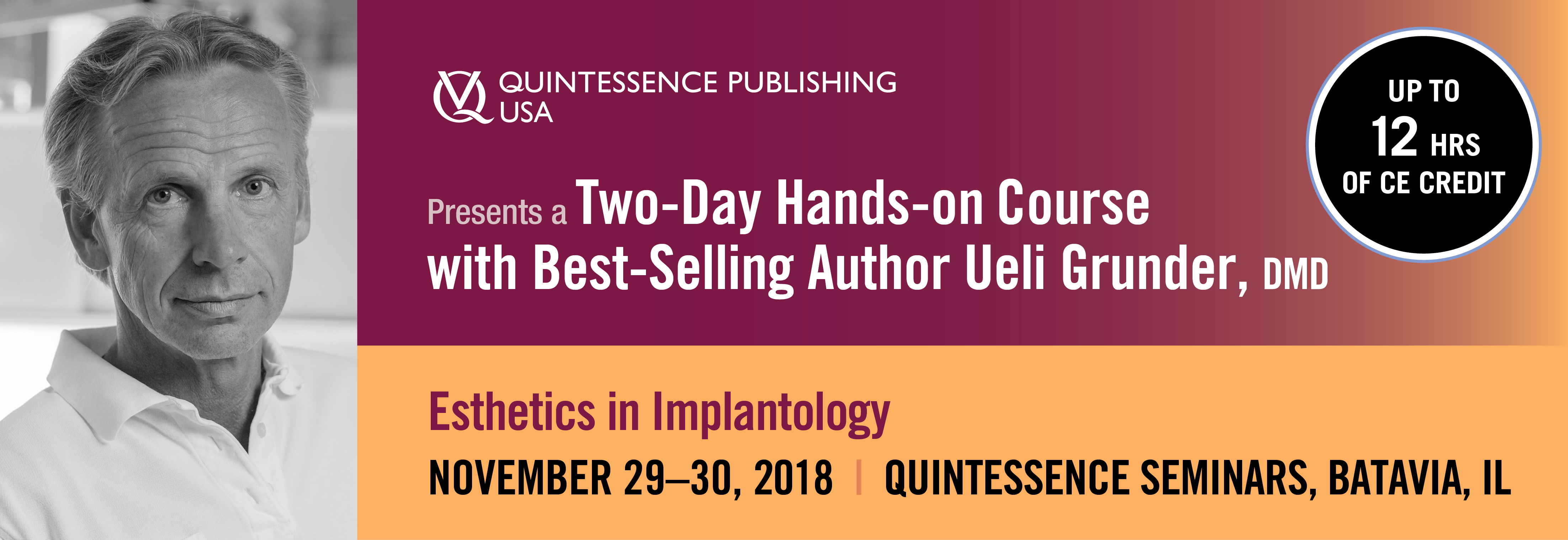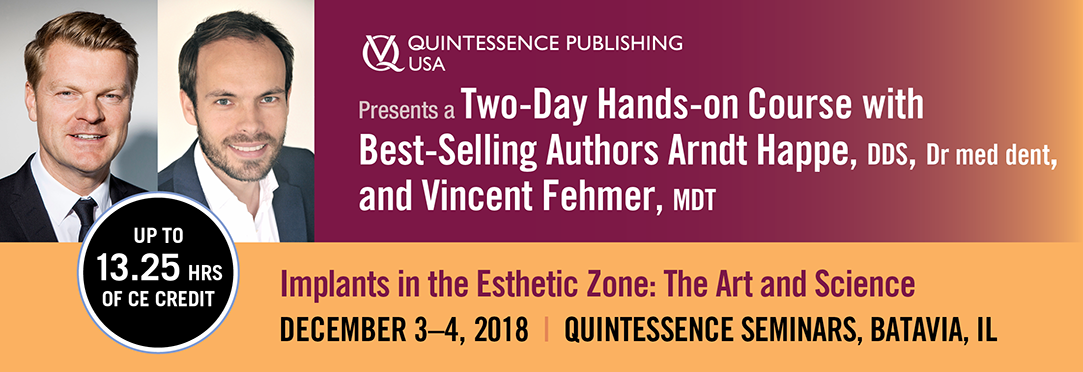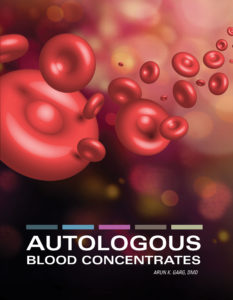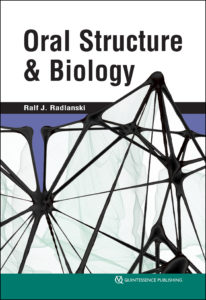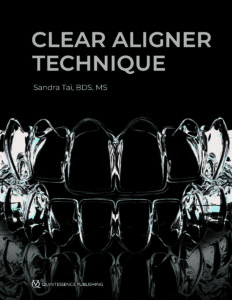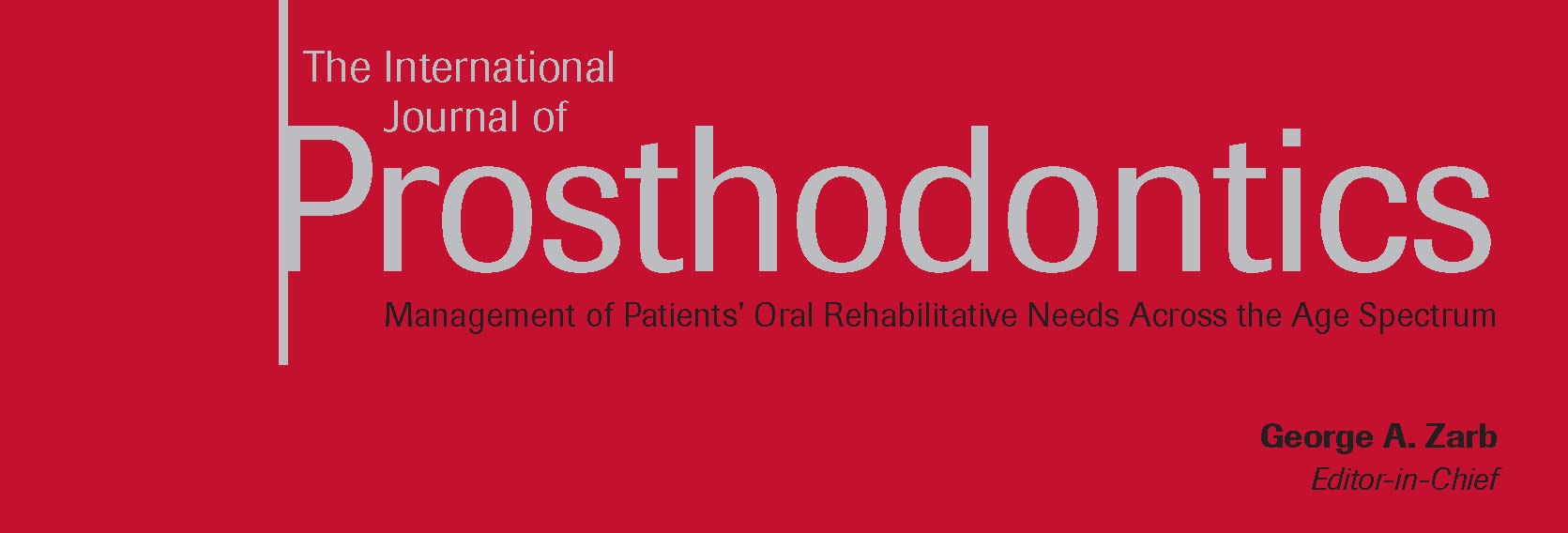August Monthly Special
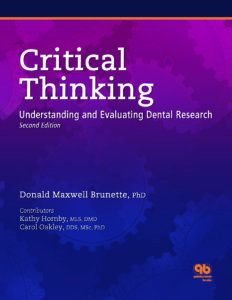 Critical Thinking: Understanding and Evaluating Dental Research, Second Edition
Critical Thinking: Understanding and Evaluating Dental Research, Second Edition
Donald Maxwell Brunette
The second edition of this classic textbook prepares readers to identify the information they need, read it from a critical vantage point, and assess the soundness of the conclusions. It introduces issues of logic, statistics, measurement, research design, and argument. Invaluable for anyone who wishes to become a discerning reader of dental literature.
324 pp (softcover); 90 illus; ©2007; ISBN 978-0-86715-426-9 (B4269); $48 Special price! $24
New Titles in Books
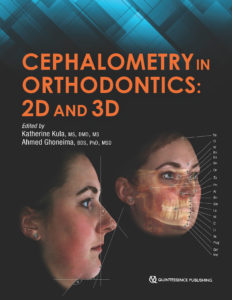 Cephalometry in Orthodontics: 2D and 3D
Cephalometry in Orthodontics: 2D and 3D
Edited by Katherine Kula and Ahmed Ghoneima
Cephalometrics has been used for decades to diagnose orthodontic problems and evaluate treatment. However, the shift from 2D to 3D radiography has left some orthodontists unsure about how to use this method effectively. This book defines and depicts all cephalometric landmarks on a skull or spine in both 2D and 3D and then identifies them on radiographs. Each major cephalometric analysis is described in detail, and the linear or angular measures are shown pictorially for better understanding. Because many orthodontists pick specific measures from various cephalometric analyses to formulate their own analysis, these measures are organized relative to the skeletal or dental structure and then compared or contrasted relative to diagnosis, growth, and treatment. Cephalometric norms (eg, age, sex, ethnicity) are also discussed relative to treatment and esthetics. The final chapter shows the application of these measures to clinical cases to teach clinicians and students how to use them effectively. As radiology transitions from 2D to 3D, it is important to evaluate the efficacy and cost-effectiveness of each in diagnosis and treatment, and this book outlines all of the relevant concerns for daily practice.
208 pp; 338 illus;©2018; ISBN 978-0-86715-762-8 (B7628); $118 Special preorder price! $94
Available Summer 2018
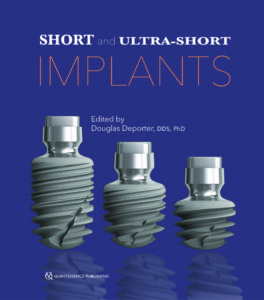 Short and Ultra-Short Implants
Short and Ultra-Short Implants
Edited by Douglas Deporter
Research has shown that short implants are not only a viable option but oftentimes a superior one that carries fewer risks for the patient and dentist, especially in resorbed jaw sites. As clinical trials continue to underscore the safety and efficacy of short implants, more dentists are considering their use with real interest, and this book provides the information clinicians need to incorporate short implants into their own practice. The book reviews the clinical effectiveness of short implants and then describes treatment protocols for the various types of short implants and their placement in different areas of the mouth. Case presentations demonstrate the recommended techniques and showcase the results.
168 pp; 334 illus; ©2018; ISBN 978-0-86715-785-7 (B7857); $85 Special preorder price! $68
Available Summer 2018
Arun K. Garg
Since the discovery of platelet-rich plasma (PRP) 25 years ago, interest in the use of autologous blood concentrates as adjuncts to surgical treatment has exploded. As more and more medically useful components of autologous blood concentrates have been identified, a host of unique acronyms such as PRF, CGF, PRGF, and more have surfaced, resulting in significant confusion among clinicians as to which material to use and when. Written by one of the original co-discoverers of PRP, this book tackles this issue of “too much information” by illuminating the science behind the clinical use of autologous blood concentrates as adjuncts to surgical treatment and helps to establish a foundation of practical knowledge for clinical use. The first part of the book summarizes the current literature from all aspects of medicine currently using autologous blood concentrates, showing both the possible applications as well as the limitations of these biologic materials. The second part of the book provides step-by-step instructions and richly illustrated treatment protocols for a number of applications for autologous blood concentrates specific to the practice of implantology and oral and maxillofacial surgery. Comprehensively researched and expertly written, this book is a must for clinicians who are just beginning to incorporate autologous blood concentrate treatment into their practice as well as experienced practitioners.
224 pp; 398 illus; ©2018; ISBN 978-0-99918-832-3 (B0007); US $199
Read more about Autologous Blood Concentrates here!
http://www.quintpub.net/news/2018/07/autologous-blood-concentrates-making-sense-of-all-the-hype/
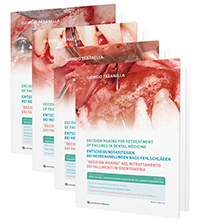 Decision Making for Retreatment of Failures in Dental Medicine (DVD-ROM)
Decision Making for Retreatment of Failures in Dental Medicine (DVD-ROM)
Giorgio Tabanella (editor)
When patients present to the dental clinic for retreatment, there is little room for error. Cases requiring retreatment may have already resulted in complications, failures, and even iatrogenic damage. It is therefore in the best interest of patients and for the discipline that clinicians share protocols, techniques, and innovations used in retreatment to improve the quality of care and avoid further error. The clinical cases depicted in this DVD compendium all lay bare two things: first the medical mistake and then the innovative fix that allowed for a successful outcome at retreatment.
DVD compendium: 4 DVDs; Format: NTSC/PAL; ©2018; ISBN 978-1-78698-006-9 (C0975); US $230 for the four-volume set or $80 each
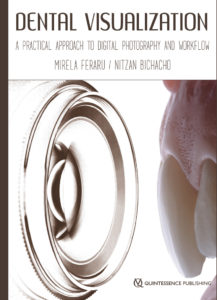 Dental Visualization: A Practical Approach to Digital Photography and Workflow
Dental Visualization: A Practical Approach to Digital Photography and Workflow
Mirela Feraru and Nitzan Bichacho
This book concentrates the authors’ extensive knowledge of clinical dental photography into a comprehensive, practical, and relevant guide for the practicing clinician. What sets this book apart from other titles available on dental photography is that it focuses not on artistic photography but rather on the concept of dental visualization: dental photographs that are taken and used as a clinically relevant tool. The major principles of dental photography are broken down into concise chapters and illustrated with high-quality, detailed images. Topics covered include photographic equipment, camera components, digital documentation, and troubleshooting. Simplified protocols for achieving high-end photographic results are presented step by step, and considerations for the different dental specialties are also described. This book promises to be an invaluable tool for both general practitioners and specialists to elevate their services provided by using dental photography.
248 pp; 556 illus; ©2018; ISBN 978-1-78698-004-5 (B9104); Now available! $158
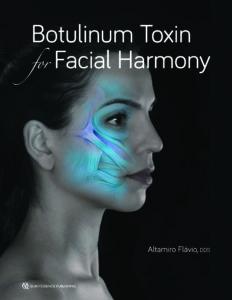 Botulinum Toxin for Facial Harmony
Botulinum Toxin for Facial Harmony
Altamiro Flávio
The mastery of dentistry brings esthetic knowledge of the face that is applicable to more than just the teeth. In the process of performing a complete facial analysis, the practitioner can identify asymmetries and concerns localized to an area—such as the forehead, eyebrows, nose, or lower face—and offer Botox therapy to increase facial harmony. This book outlines the many clinical uses for Botox, with detailed illustrations and case presentations to support each procedure. The first part of the book covers systematic facial analysis, photographic documentation, and how to plan treatment. Special attention is paid to the anatomy and physiology of the face and the identification of injection points. Detailed treatment instructions for dosage, syringe type, and needle size are included for each procedure, as well as guidelines on how to evaluate results anthropometrically to determine whether esthetic treatment goals have been met. This stunning book will change the way you approach facial analysis and widen your esthetic treatment options for patients.
160 pp; 359 illus; ©2018; ISBN 978-0-86715-787-1 (B7871); Now available! $148
Read more about Botulinum Toxin for Facial Harmony here!
Botulinum Toxin for Facial Harmony: How this Unconventional Treatment Can Expand Your Practice
Ralf J. Radlanski
Knowledge of the structures of the orofacial region from the macroscopic scale to the molecular level and pathologic changes to those structures enables practitioners to successfully treat patients or seek treatment options. This book presents the structural biologic foundations underpinning dental and oral medicine. Beginning with an overview of the anatomy of the mouth and moving on to the evolution of the oral structures and pre- and postnatal development of the oral cavity, related facial structures, and the teeth, this book describes each part of the orofacial region in terms of its morphology, tissue structure, cellular properties, and development. Functioning as both a textbook for dental students and a reference manual for experienced clinicians, this compendium of the structural biologic foundations of clinical work in dental and oral medicine allows practitioners to integrate current research in molecular biology into a solid framework of knowledge.
472 pp (softcover); 245 illus; ©2018; ISBN 978-0-86715-746-8 (B7468); Now available! $168
Sandra Tai
Clear aligners are the future of orthodontics, but digital orthodontics evolves so rapidly that it is hard to keep pace. This book approaches clear aligner treatment from a diagnosis and treatment-planning perspective, discussing time-tested orthodontic principles like biomechanics and anchorage and demonstrating how to apply them to orthodontic cases using these appliances. Each chapter explains how to use clear aligners to treat a given malocclusion and teaches clinicians how to program a suitable treatment plan using available software, how to design the digital tooth movements to match the treatment goals, and finally how execute the treatment clinically and finish the case well. This clinical handbook will prepare orthodontists and dental students to exceed patient expectations with the most esthetic orthodontic appliance currently available.
320 pp; 1,344 illus; ©2018; ISBN 978-0-86715-777-2 (B7772); Now available! $218
Read more about Clear Aligner Technique here!
Clear Aligner Technique: Bringing Orthodontic Treatment into the Digital Era
Current Issues in Journals
Featured article: The Laterally Closed Tunnel for the Treatment of Deep Isolated Mandibular Recessions: Surgical Technique and a Report of 24 Cases
Anton Sculean and Edward P. Allen
A 13- to 32-Year Retrospective Study of Bone Stability for Machined Dental Implants
Massimo Simion, Myron Nevins, Giulio Rasperini, and Francesco Tironi
Immediate Implant Placement in Single-Tooth Molar Extraction Sockets: A 1- to 6-Year Retrospective Clinical Study
Francesco Amato and Giorgio Polara
Prevalence of Abnormal Morphology of the Temporomandibular Joint in Asymptomatic Subjects: A Retrospective Cohort Study Utilizing Cone Beam Computed Tomography
Thiago Azário de Holanda, Rita de Cássia Costa Ribeiro de Almeida, Alexandre Emídio Ribeiro Silva, Melissa Feres Damian, and Noéli Boscato
Peri-implant Tissue Health and Bone Resorption in Patients with Immediately Loaded, Implant-Supported, Full-Arch Prostheses
Maria Menini, Paolo Setti, Paolo Pera, Francesco Pera, and Paolo Pesce
Investigation of Clinical and Laboratory Wear in Locator-Supported, Implant-Retained Overdentures
Sebastian Hahnel, Christos Alamanos, Sibylle Schneider-Feyrer, Matthias Stöckle, and Martin Rosentritt
Featured Article: Impact of Surface Chemistry Modifications on Speed and Strength of Osseointegration
Hyeon-Goo Kang, Yong-Soo Jeong, Yoon-Hyuk Huh, Chan-Jin Park, and Lee-Ra Cho
Thematic Abstract Review: Dental Implant Treatment of Atrophic Arches With or Without Augmentation
Jan-Eirik Ellingsen
Evaluation of Two 3D Printers for Guided Implant Surgery
Bruno Sommacal, Miodrag Savic, Andreas Filippi, Sebastian Kühl, and Florian M. Thieringer
Editorial: A Parting Perspective of the Journal’s Evolution
Barry J. Sessle
Peripheral Glial Cell Line–Derived Neurotrophic Factor Facilitates the Functional Recovery of Mechanical Nociception Following Inferior Alveolar Nerve Transection in Rats
Masahiro Watanabe, Masamichi Shinoda, Dulguun Batbold, Naoyuki Sugano, Shuichi Sato, and Koichi Iwata
Analgesic Effects of Intranasal Ketamine in Rat Models of Facial Pain
Rafaela Claudino, Carina Nones, Erika Araya, and Juliana Chichorro
Short clinical screening procedure for initial diagnosis of temporomandibular disorders
Georg Meyer
Multidisciplinary treatment-increase of vertical dimension combined with Invisalign treatment
Beatriz Solano Mendoza, Lorena Gómez García, Hourieh Pourhamid, and Enrique Solano
Correcting severe deep bite with the Invisalign appliance
Bärbl Reistenhofer, Fanny Triessnig, and Katharina Besser
Dental Meetings Quintessence Will Attend in August
Dental XP Implant Summit
hosted by Dental XP, August 11–12 in New York, New York
XXIII Seminario Ivoclar Vivadent: #E21
hosted by Ivoclar Vivadent, August 17–18 in Ciudad de México, México
Upcoming Quintessence Events
